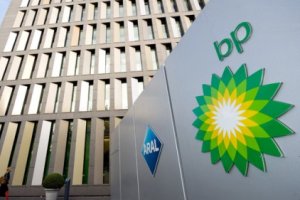 In a settlement announced this afternoon by U.S. Attorney General Eric Holder, BP has agreed to pay approximately $4.5 billion and plead guilty to criminal charges in a settlement with the U.S. Department of Justice over the deadly 2010 Deepwater Horizon oil rig explosion led to the largest oil spill in U.S. history.
In a settlement announced this afternoon by U.S. Attorney General Eric Holder, BP has agreed to pay approximately $4.5 billion and plead guilty to criminal charges in a settlement with the U.S. Department of Justice over the deadly 2010 Deepwater Horizon oil rig explosion led to the largest oil spill in U.S. history.
The settlement total, to be paid out over five years, includes more than $1.25 billion in criminal fines -- the largest such penalty ever.
In addition, two BP employees have been indicted on manslaughter charges and a BP executive has been indicted on charges he lied to authorities about his work estimating the Gulf spill rate.
Holder called the settlement "the latest step forward in our ongoing efforts to achieve justice for those whose lives and whose livelihoods were impacted by the largest environmental disaster in the history of the United States, and to hold accountable those who bore responsibility for this tragedy."
The London-based oil giant said it would plead guilty to 11 felony counts of misconduct or neglect relating to the death of 11 workers, one misdemeanor count under the Clean Water Act, one misdemeanor count under the Migratory Bird Treaty Act, and one felony count of obstruction of Congress.
A statement from BP's CEO apologized for the company's role in the disaster.
"All of us at BP deeply regret the tragic loss of life caused by the Deepwater Horizon accident as well as the impact of the spill on the Gulf coast region," said Bob Dudley. "From the outset, we stepped up by responding to the spill, paying legitimate claims and funding restoration efforts in the Gulf."
"We apologize for our role in the accident, and as today's resolution with the U.S. government further reflects, we have accepted responsibility for our actions," he added.
A spokesman for advocacy group Public Citizen called the settlement “a slap on the wrist.”
“The $4 billion penalty is equivalent to just a fifth of the company’s 2011 profits,” said Public Citizen’s Tyler Slocum. “The point of the criminal justice system is twofold: to punish and to deter. This does neither. It is a weak-tea punishment that provides zero deterrence to BP or other companies. Consider that after the 2005 Texas refinery explosion that killed 15 people, BP pleaded guilty to a criminal charge and paid a fine. Now, after a 2010 event that killed 11 people, BP is again pleading guilty and paying a fine. Zero deterrence.”
Tom O’Connor, Executive Director, National Council for Occupational Safety and Health, called the fine amount is “a drop in the bucket” compared to BP’s $5.5 billion profit last quarter.
“Real justice for the 11 workers killed in the Deepwater Horizon explosion would be a strengthened OSH Act that allows for proper sanctions for all employers whose negligence lead to the loss of lives of their employees,” said O’Connor. “Following the BP disaster, Congress failed to take action to strengthen the criminal prosecution provisions of the OSH Act. “
O’Connor urged Congress to revisit the issue and institute “long overdue” reforms of the nation’s outdated worker safety laws.
Family members of some of the 11 workers killed in the explosion had mixed reactions to the settlement.
Bill Anderson said the agreement with BP doesn’t bring his son Jason back, “but it does show everbody that they’re guilty and everybody knows it.”
"I knew all along that BP was the devil in that accident," said 59-year-old Arlene Weise, whose son Adam was one of the fatalities. "Now they're getting their due." She added: "It doesn't matter how much money anyone pays. It doesn't nearly amount to what we've lost.”



